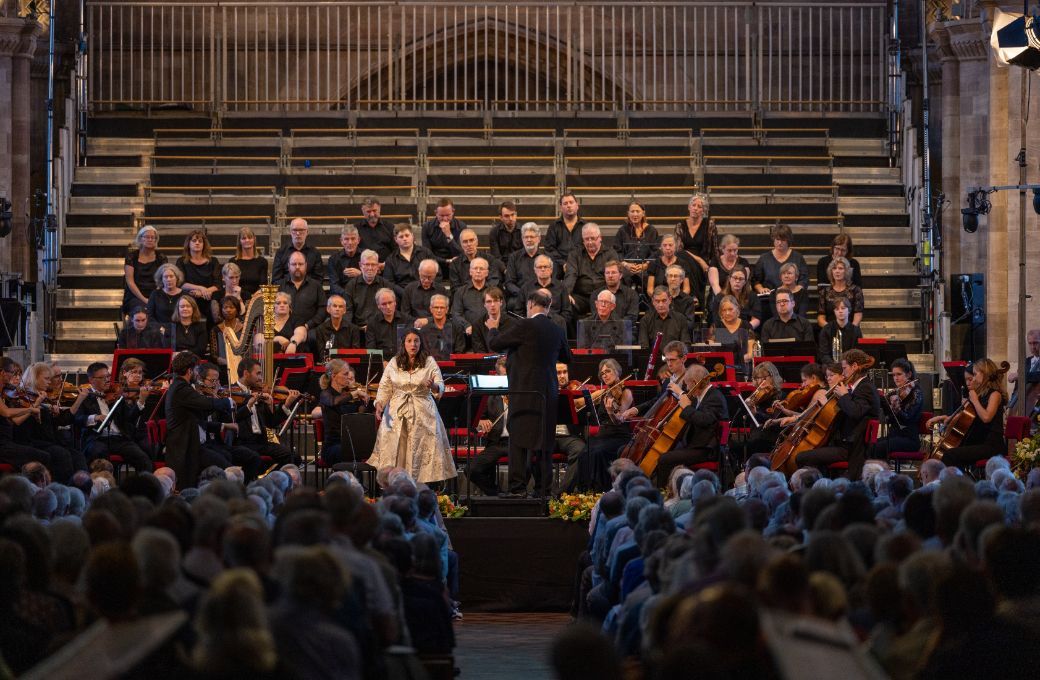The title of last Friday’s evening Three Choirs Festival concert, “Transformations”, turned out to be as relevant to Adrian Partington’s approach as to the music. He had two conflicting modes of direction: one strong and effulgent, when the tone of the music was clear and obvious, the other blank and confused, when things were more ambiguous. Thus, Stravinsky’s arrangement of Bach’s Vom Himmel Hoch was given a workaday, mundane performance, mistaking its keen focus on counterpoint as being the only element of interest. The Philharmonia kept things flowing, yet there was minimal spark or zest. It was like hearing a flat 2D representation of a 3D object, dynamically inert, rhythmically rigid, fatally embedded in the ruts of an eternal grid.

The wild fluctuations of tone in Poulenc’s Stabat mater were met with a similarly uncertain response, Partington deciding (as many do) that the twin aspects of the composer’s personality are irreconcilable. The result was a wild oscillation between extremes of solemnity and lightness, as if music by two composers had been mashed-up into a weirdly incongruous whole. There was no room for subtlety, everything became exaggerated, one minute conveying the quality of a cortege, the orchestra heavily trudging along with leaden footsteps, the next lurching into bright and breezy lilting and scurrying. In a similar way to the Stravinsky, it was a matter-of-fact performance, not so much interpreting the music as simply reporting it, stating what was on the page with an implied shrug of incomprehension.
The transformation when Partington turned to the other two works on the programme could hardly have been more complete. The Young Person’s Guide to the Orchestra was genuinely marvellous, the Philharmonia launching into it as if for the first time. The genius of the work goes beyond the notes; whatever our actual age, Britten’s eternally crowd-pleasing reworking of Purcell makes all of us children again, listening in wonder to the same tune being bounced between sections of the orchestra, emerging in ever new forms. Here, the veering between shifts in character worked due to the music’s inherent playfulness. While there was again a lack of subtlety, this led both to a nice delivery of the darker-hued music (which almost spoke with greater power than the more robust sections) and an overwhelmingly exuberant air of grandiosity through the work’s latter sequences.
The one work on the programme that spoke with absolute authenticity and nuance was Finzi’s Dies Natalis, and this was almost entirely due to soprano Elizabeth Watts. She sang from memory, yet at no point did she give the impression of someone performing words and music previously learned. She became the words and music, they were an integral, inextricable part of her, apparently being articulated in a real time, emotionally electric stream of consciousness. The orchestra set the scene wonderfully, turning the opening Intrada into a dark pastorale of endless lyricism with trouble at its core. Whereupon Watts made it all her own, transforming Finzi’s dated musical language into something fresh and vital, laden with fiery passion, transfixed wonder and a gorgeous sense of ineffable tranquillity. The Philharmonia thereafter evoked the contrapuntal energy of Tippett, causing Watts to sing as if her life depended on it, before effortlessly inverting everything, making the fourth movement arioso seem as if she were singing to herself in an exquisite display of poignant intimacy. This continued to the end, grounding the words’ elevated tone with a humble, earthbound music, full of quiet grandiosity. The enormous roars of approval and lengthy applause testified to the astonishing power of Watts’ unforgettable performance.


